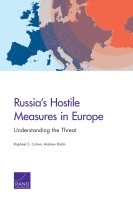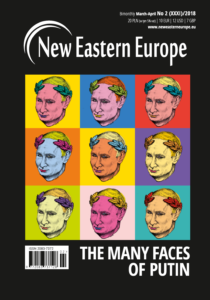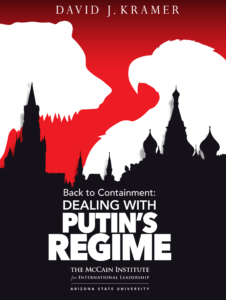 Russian interference has undermined democracy in the West by destabilizing institutions and polarizing societies. Western democratic governments had to strengthen their domestic institutions to protect against adversaries eager to exploit weaknesses, according to a recent forum, organized by the Foreign Policy Research Institute (FPRI), the Department of Russian and East European Studies at the University of Pennsylvania, and the Penn-Temple European Studies Consortium.
Russian interference has undermined democracy in the West by destabilizing institutions and polarizing societies. Western democratic governments had to strengthen their domestic institutions to protect against adversaries eager to exploit weaknesses, according to a recent forum, organized by the Foreign Policy Research Institute (FPRI), the Department of Russian and East European Studies at the University of Pennsylvania, and the Penn-Temple European Studies Consortium.
The Kremlin’s increased risk-taking has progressed in three main phases with five primary drivers, said Dr. Michael Carpenter, a Senior Director of the Penn Biden Center and former Deputy Assistant Secretary of Defense:
- The first phase of progressive risk-taking came after Vladimir Putin rose to power. This marked the beginning of attacks on institutions and liberal democratic norms within Russian borders.
- The next phase occurred during Russia’s 2007 and 2008 attacks on Estonia and Georgia, respectively.
- During the third phase, Russia decided to oppose the West across areas where it believes it
 has an asymmetric advantage. Five drivers account for this:
has an asymmetric advantage. Five drivers account for this:
-
- Putin’s consolidation of power
- the reconfiguration of power resources and balance of power
- fear of revolution and the threat of liberal democratic norms undermining the legitimacy of the Putin regime
- the so-called Putin doctrine (continuous political warfare as necessary to confront the West)
- the advent of new technologies like social media and Western countries’ cyber and campaign finance vulnerabilities.
 Authoritarian regimes like Russia have bet big on technology—including social media manipulation as well as new applications of artificial intelligence—as a tool to control political debate at home and disrupt democracy abroad, says Alina Polyakova, the David M. Rubenstein Fellow in the Foreign Policy program at the Brookings Institution and an adjunct professor of European studies at the Paul H. Nitze School of Advanced International Studies at Johns Hopkins University. Christopher Walker, vice president for studies and analysis at the National Endowment for Democracy, and Shanthi Kalathil, senior director for NED’s International Forum for Democratic Studies, cohost the conversation.
Authoritarian regimes like Russia have bet big on technology—including social media manipulation as well as new applications of artificial intelligence—as a tool to control political debate at home and disrupt democracy abroad, says Alina Polyakova, the David M. Rubenstein Fellow in the Foreign Policy program at the Brookings Institution and an adjunct professor of European studies at the Paul H. Nitze School of Advanced International Studies at Johns Hopkins University. Christopher Walker, vice president for studies and analysis at the National Endowment for Democracy, and Shanthi Kalathil, senior director for NED’s International Forum for Democratic Studies, cohost the conversation.
On the offensive at home, the Kremlin is on the defensive at home.
Russia has established a Social Engineering Agency to develop measures to oppose color revolutions, Johnson’s Russia List reports:
 “In my view, this is a grand idea. It’s the first time that steps to prevent the implementation of scenarios inspired from the outside to dismantle a constitutional system will be discussed at the expert and professional level,” State Duma Foreign Affairs Committee head Leonid Slutsky told journalists …”We have repeatedly seen examples of dirty manipulation of public opinion or destabilization of a situation using lapdog media and NGOs,” he said.
“In my view, this is a grand idea. It’s the first time that steps to prevent the implementation of scenarios inspired from the outside to dismantle a constitutional system will be discussed at the expert and professional level,” State Duma Foreign Affairs Committee head Leonid Slutsky told journalists …”We have repeatedly seen examples of dirty manipulation of public opinion or destabilization of a situation using lapdog media and NGOs,” he said.
“This is a new analytical center focused on intellectual analysis of the subject of coups d’etat and color revolutions,” said Anton Davidchenko, the agency’s coordinator.
Does the Kremlin seek to undermine democracies because of an ideological dislike of that form of government, or have the Russians taken action against governments that happen to be democracies? Nikolas K. Gvosdev asks. In contrast to very public denunciations of Russian actions by Western governments, non-Western democracies seem prepared to argue that the Kremlin appears to be uninterested in involving itself in their political affairs, he writes for the National Interest:
- First, if Russian activity is driven less by ideology and more by state interest, then there is no benefit to overt interference in the major non-Western democracies. For the most part, these countries have reasonably stable relationships with Russia that are not impacted by electoral changes. Successive Indian, Japanese, Korean and Brazilian governments have maintained a high degree of continuity in their policies towards Russia, meaning that there is no clear incentive to back one particular party or candidate over another.
 Second, democracies in the non-Western world tend to see forms of government not as universal but sui generis to particular countries and civilizations. None of the major non-Western democracies view democracy promotion as an integral part of their foreign policy nor do they expect that their partners share similar forms of government.
Second, democracies in the non-Western world tend to see forms of government not as universal but sui generis to particular countries and civilizations. None of the major non-Western democracies view democracy promotion as an integral part of their foreign policy nor do they expect that their partners share similar forms of government.- Add to this a strong neo-Westphalian bent of some of the major Southern-cone states—notably India—which prizes sovereignty and non-interference in the domestic affairs of other states, which, in turn, produces little impetus to export particular models of governance to other countries. How Russia governs itself, therefore, is not really a concern in Seoul or Brasilia….
“What could change this state of affairs?” Gvosdev asks. “One factor is whether, in the coming years, parties and politicians emerge in the non-Western democracies that are antagonistic to Russia or more inclined to embrace notions of democracy promotion.”







